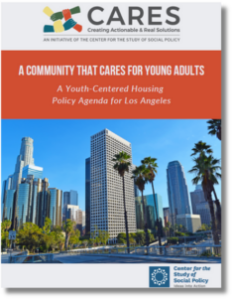A Youth-Centered Housing Policy Agenda for Los Angeles
For young people, housing is a basic need and essential for a successful transition to adulthood. Safe and stable housing promotes health and wellbeing and supports young people as they pursue education, employment, and other goals. Yet in Los Angeles, an extreme housing shortage has left Angelenos, especially those with the lowest incomes, struggling to afford housing. Young people, who often live paycheck to paycheck with little to no savings, are particularly overburdened by Los Angeles’ high housing costs.
Across Los Angeles County, nearly two-thirds of unhoused young people attribute their lack of housing to economic hardship, and in the city, among young Angelenos ages 18 to 25, median rent alone claims 46 percent of their income. While housing assistance is available, these supports are underfunded, limited, and hard to navigate. For example, housing vouchers defray rental costs, but young Angelenos contend with 20 different Public Housing Authorities (PHAs) in the county, years-long waitlists, and limitations on where they can use their vouchers. Having a voucher in hand also does not guarantee housing, as landlords commonly discriminate against voucher holders, and young people often have difficulty finding a suitable rental within the required timeframes. While these problems exist for residents of all ages, young adults are hit hard because they have little to no experience with the housing market and do not know how to navigate a bureaucracy like the housing system. These challenges are particularly acute for young people aging out of foster care and youth of color, leading to high rates of homelessness and housing instability for these young people.
In our conversations with CARES Ambassadors in Los Angeles, they consistently talked about wanting a different and better housing experience. They talked about wanting a place of their own, a place that would always be there, a sanctuary, a safe space where they could focus on life and pursue their goals.
One Ambassador who is raising a young child talked about wanting to provide a nurturing, safe, and stable home for him. She described a “thriving environment that would support my goals and future and allow me to focus on my mental health as a parent—a supportive environment for me as a parent.” Another Ambassador shared that he hopes for “somewhere that I can have my own space and feel safe and at peace, and not worry about anything.” Most of all, they talked about stability and a future where they no longer have to worry about their housing. The following policy agenda reflects CARES Ambassadors’ vision for a housing system that supports young people in Los Angeles, as well as their ideas for how to achieve this vision.

